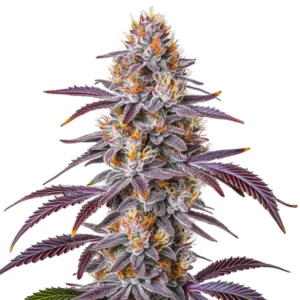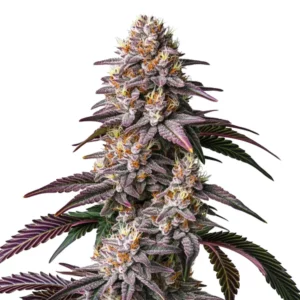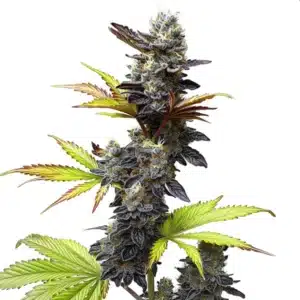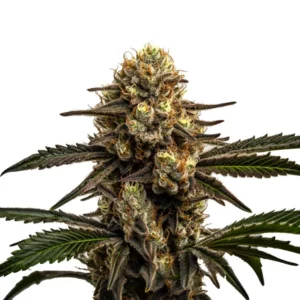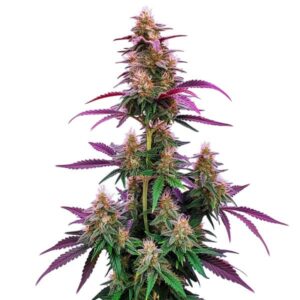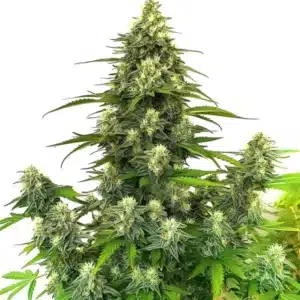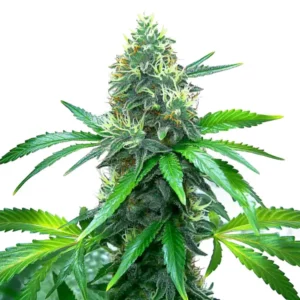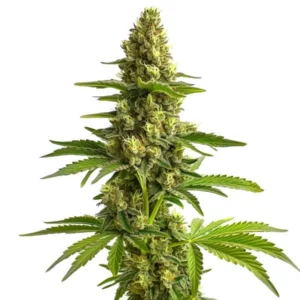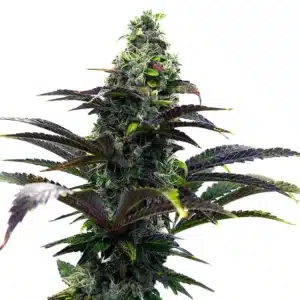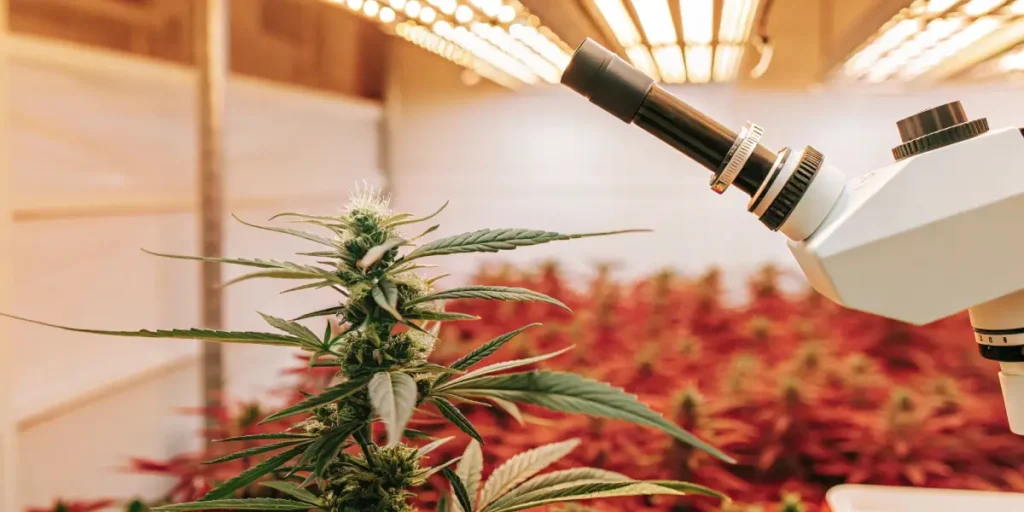
What Are Enzymes in Cannabis?
Enzymes in cannabis are like tiny helpers that speed up chemical reactions in the plant. They are proteins that play a crucial part in the growth and development of the cannabis plant. Without them, many important processes would be too slow to support the plant’s life cycle effectively.
One of the key ways enzymes make a difference is by aiding in the breakdown of complex molecules into simpler ones. This breakdown is essential for the plant to absorb nutrients efficiently. For first-time growers, knowing how these enzymes work can help in cultivating healthier plants with higher yields.
Recommended Strains
Experienced growers often focus on optimizing enzyme activity to enhance their plants’ performance. Strains like Bruce Banner #3 benefit from such optimization, resulting in robust growth and potent flowers. By managing enzyme activity, growers can unlock the plant’s full potential.
Enzymes and Cannabis Growth
Enzymes are pivotal in the seed germination process. They break down stored food within the seed, providing the necessary energy for the seedling to sprout. This early stage is critical for establishing strong roots and healthy initial growth.
As the plant matures, enzymes continue to support various functions such as photosynthesis and nutrient absorption. For instance, enzymes help convert sunlight into energy, which fuels the plant’s growth. Cannabis strains like Gelato thrive when these processes are optimized, leading to vibrant plants.
Knowing the function of enzymes in the cannabis plant is essential for maximizing growth potential. These catalysts not only support the transformation of nutrients into usable forms but also aid in cell division and expansion. By ensuring enzymes function properly, growers can maintain the health and vitality of their plants throughout the growth cycle.
Environmental conditions play a significant role in enzyme activity. Factors such as soil quality, temperature, and humidity can influence how effectively enzymes operate. By monitoring and adjusting these conditions, growers can create an optimal environment that supports robust enzyme activity and plant development.
Promos & Deals
Cannabinoid Production and Enzymes
Enzymes play a direct role in cannabinoid production. They are involved in converting precursor compounds into active cannabinoids like THC and CBD. This transformation is crucial for producing the desired effects in cannabis products.
By influencing these enzymatic activities, growers can affect the potency of their cannabis. Strains such as GG4 Auto can have varying levels of cannabinoids depending on how enzymes are managed during cultivation.
The process of cannabinoid synthesis is intricate and heavily reliant on enzymes. Cannabis enzymes and cannabinoid production are intertwined, with enzymes acting as the driving force behind the conversion of cannabinoid acids into their active forms. This conversion is essential for creating the psychoactive and therapeutic effects associated with cannabis.
Growers aiming to enhance cannabinoid levels should focus on optimizing enzyme activity throughout the plant’s life cycle. This involves not only managing growing conditions but also providing the right nutrients that support enzyme function. By doing so, they can produce cannabis with higher concentrations of the desired cannabinoids, enhancing both quality and efficacy.
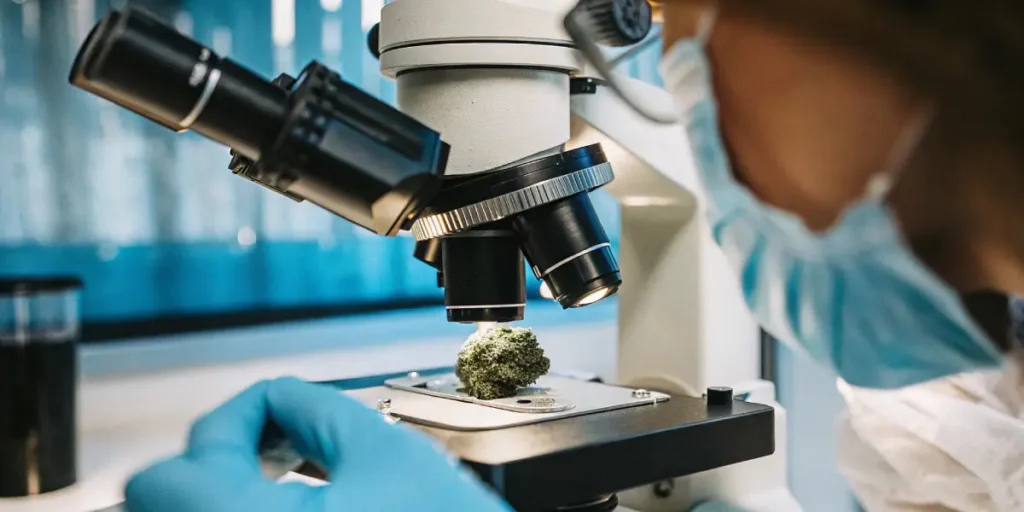
Metabolism and Enzymes in Cannabis
Enzymes are also involved in cannabis metabolism. They help the plant process nutrients and regulate biochemical pathways. This regulation is vital for maintaining the plant’s health and resilience against stressors like pests and diseases.
Knowing enzymes in cannabis metabolism can aid in diagnosing and correcting nutrient deficiencies. For example, if a plant shows signs of stress, adjusting the nutrient mix to support enzyme activity can often bring it back to health.
Enzymes in cannabis metabolism are crucial for breaking down complex nutrients into simpler forms that the plant can readily absorb. This process ensures that the plant receives adequate nutrition to support growth, flowering, and overall health. Growers can enhance these metabolic processes by providing a balanced diet that includes enzyme-friendly nutrients.
Additionally, enzymes play a role in detoxifying the plant, helping to eliminate harmful compounds that could otherwise impede growth. By supporting enzyme activity, growers can ensure that their cannabis plants not only thrive but also develop a natural resistance to common stress factors that could otherwise affect yield and quality.
Enzymes and Cannabis Extraction
In the extraction process, enzymes play a vital role in breaking down plant material to release cannabinoids and terpenes. This breakdown is essential for producing high-quality extracts used in oils, tinctures, and edibles.
Enzymes involved in cannabis extraction help achieve a more efficient separation of desired compounds from the plant. This efficiency results in purer and more potent products, which is especially important in commercial operations.
The extraction process benefits from enzymes by enhancing the extraction of active ingredients while minimizing impurities. Enzymes involved in cannabis extraction target specific components, making it possible to isolate cannabinoids and terpenes with greater precision. This precision is critical for producing extracts that meet high quality and potency standards.
By knowing what are enzymes in cannabis and their impact during extraction, producers can refine their processes to achieve better results. This knowledge enables them to create superior products that appeal to consumers seeking both medicinal and recreational benefits, ensuring a competitive edge in the marketplace.
Practical Tips for Enhancing Enzyme Activity
To enhance enzyme activity, consider optimizing environmental factors such as temperature and pH levels. Enzymes function best within specific ranges, and maintaining these can lead to healthier, more productive plants.
Additionally, using enzyme supplements specifically designed for cannabis can boost activity. These supplements support plant growth and increase resistance to environmental stresses, resulting in more resilient plants.
Regular monitoring of environmental conditions can help maintain optimal enzyme activity. Small adjustments in temperature and pH can make a significant difference in enzyme efficiency, leading to improved plant health and increased yields. Consistency in these conditions is key to unlocking the full potential of enzyme actions.
Incorporating organic matter into the soil can also promote enzyme activity. Organic compounds provide a rich source of nutrients that enzymes can break down, fostering a healthier growing environment. This approach not only benefits enzymes but also enhances the overall quality and sustainability of the growing medium.
- Maintain optimal temperature and pH levels for enzyme activity.
- Use enzyme-specific supplements for cannabis plants.
- Ensure consistent watering and nutrient supply to support enzyme functions.
- Monitor plant health regularly to adjust enzyme management strategies.
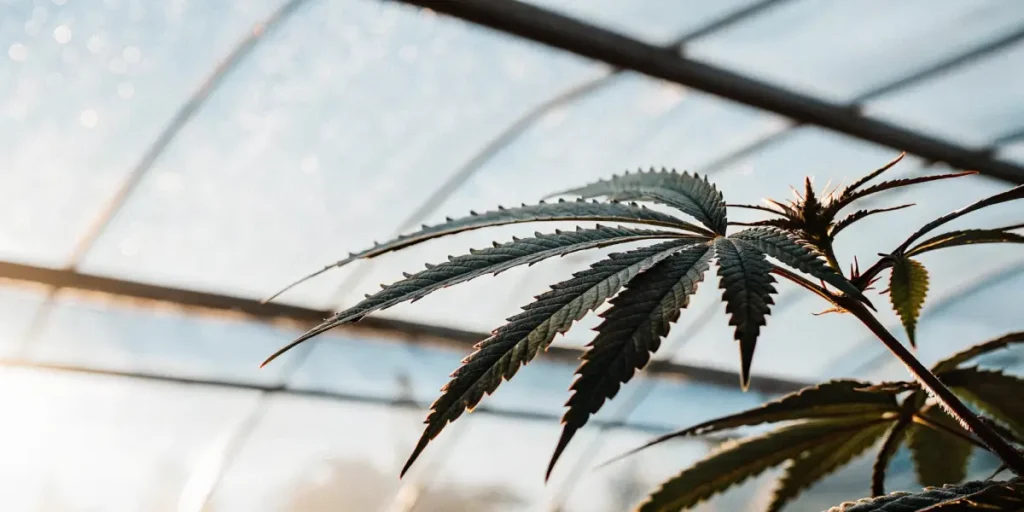
FAQs
How Do Enzymes Affect Cannabis Potency?
Enzymes directly impact the potency of cannabis by regulating cannabinoid synthesis. This regulation allows for the conversion of inactive compounds into active ones, like THC and CBD. The efficiency of these processes can significantly affect the overall strength of the final product.
For growers, managing enzymes means they can fine-tune the potency of their crops. By ensuring that enzymes are functioning optimally, they can maximize the levels of desired cannabinoids, providing consumers with more effective products.
Knowing how enzymes affect cannabis potency is crucial for producing high-quality cannabis. Enzymes facilitate the transformation of precursor molecules into potent cannabinoids, influencing the strength and effects of the final product. This enzymatic action is a vital step in creating the balance of compounds that define a strain’s unique profile.
Growers who appreciate the function of enzymes can manipulate growing conditions to enhance potency. By strategically managing factors that influence enzyme activity, such as nutrient availability and environmental settings, they can encourage the production of cannabinoids that align with consumer preferences for both recreational and medicinal use.
How Can Enzymes Improve Cannabis Yields?
By enhancing nutrient uptake and stress resistance, enzymes can lead to improved cannabis yields. They help the plant convert nutrients into energy more efficiently, promoting vigorous growth and abundant flowering.
Growers focusing on enzyme activity can often see a noticeable increase in their harvest. Whether growing indoors or outdoors, ensuring enzyme support can lead to bumper crops that are both potent and plentiful.
Enzymes play a pivotal role in optimizing the plant’s growth potential, directly impacting yields. By improving the plant’s ability to absorb and utilize nutrients, enzymes contribute to more robust growth patterns and increased flower production. This enhancement is crucial for achieving higher yields with each cultivation cycle.
Moreover, enzymes help the plant manage environmental stress, which can otherwise limit growth and yield. By supporting enzyme activity, growers can build a more resilient crop that withstands fluctuations in conditions, leading to a more consistent and abundant harvest.
Which Strains Benefit Most from Enzyme Optimization?
While all cannabis strains can benefit from enzyme optimization, some may show more dramatic improvements. Strains that are known for their high cannabinoid content, like Bruce Banner #3, tend to respond well to enzyme management.
These strains can achieve higher potency and yield when enzymes are optimized, making them a popular choice for both recreational and medicinal growers looking to maximize their return.
Strains with complex genetic backgrounds often show significant gains from enzyme optimization. These strains typically have higher demands for nutrient processing and benefit from enhanced enzyme activity to fully express their genetic potential. By focusing on enzyme management, growers can unlock these strains’ full capabilities.
Additionally, strains bred for specific cannabinoid profiles may require optimized enzyme activity to reach their desired potency levels. Knowing what are enzymes in cannabis and applying this knowledge can lead to superior results, meeting both market demands and consumer expectations.
Can Enzymes Help with Pest Resistance?
Enzymes contribute to a plant’s natural defense mechanisms. By maintaining healthy enzyme activity, plants are often more resilient against pests and diseases. This resilience reduces the likelihood of infestations and the need for chemical interventions.
Growers can focus on enzyme support to enhance their plants’ immune systems, leading to healthier crops and more sustainable growing practices. This approach not only benefits the plants but also the environment by reducing the need for pesticide use.
Enzymes in cannabis metabolism are integral to building a plant’s natural defenses. They help synthesize compounds that deter pests and pathogens, offering a natural form of protection that minimizes the need for chemical treatments. By promoting enzyme activity, growers can enhance the plant’s innate ability to resist external threats.
Incorporating enzyme-boosting practices into cultivation strategies not only supports plant health but also aligns with sustainable agriculture principles. This approach contributes to a more balanced ecosystem, reducing the environmental impact of cannabis farming and promoting long-term soil health.
Are There Specific Products to Boost Enzyme Activity?
Yes, there are products specifically designed to boost enzyme activity in cannabis plants. These products often come in the form of enzyme supplements or additives that can be mixed with water and applied during watering.
Using these products can support plant health and improve growth outcomes. When choosing enzyme boosters, consider the specific needs of your plants and consult with fellow growers to find the most effective solutions.
Products formulated to enhance enzyme activity typically contain a blend of nutrients and compounds that support enzymatic functions. These supplements are designed to be easily absorbed by the plant, providing immediate benefits to enzyme activity and overall plant health.
When selecting enzyme products, it’s important to consider factors such as the growth stage of the plant and the specific challenges of the growing environment. Tailoring your enzyme supplementation strategy can lead to more effective results, ensuring that your cannabis plants thrive under a variety of conditions.


